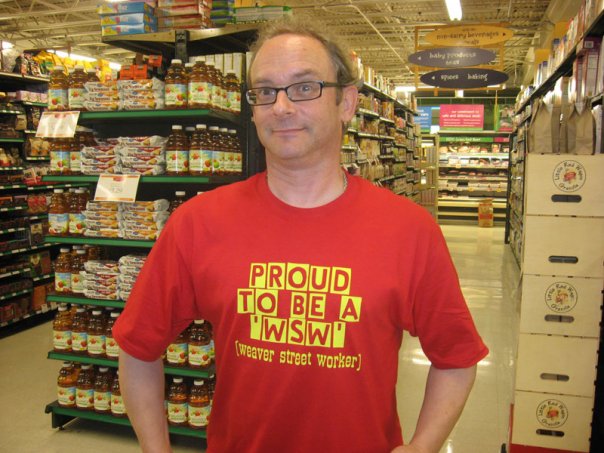 The past few weeks have been a body blow to irrational consumerism in the US. My fear is that my local food co-op, far from being a part of the alternative solution, continues to be a part of the problem.
The past few weeks have been a body blow to irrational consumerism in the US. My fear is that my local food co-op, far from being a part of the alternative solution, continues to be a part of the problem.
In the US as a whole, fiscal irresponsibility, beginning in the Eighties, and fueled by successive administrations in the Nineties and then the Noughts, led to cheap money. Which created an unsustainable housing bubble. Which, through dicky mortgages and tacky marketing caused a consumer spending boom. Which put us all in debt we could not afford.
The economy finally hiccuped (2007/2008). Interest rates tweaked. Mortgages went unpaid. Enter foreclosures. Banks tanking. Getting bailed out. Putting governments even further into debt. Leading to the government debt crisis in the US and Europe (2011). And our hope we have all learned our lesson.
Meanwhile, Weaver Street Market Co-operative, happily skipping along as a two-unit and restaurant co-op, genuinely serving the expressed common needs of its stakeholders, as good co-op’s are supposed to do (cf. ICA
definition of co-op) suddenly decided, in 2007, it wanted to abandon co-op principles, take advantage of the cheap money, and, without properly consulting its stakeholders (naughty; cf. ICA co-op principles of democracy and openness), expand to three units, a restaurant and a Food House, and become a traditional, consumerist,
chain store.
As with everyone else, the Great Recession came along. And WSM found itself $10 million in debt (on turnover of about $20 million at that time), with sales going in the wrong direction.
Did those we have consented to manage our community co-op do the right thing (again, cf. ICA principles of transparency, democracy and accountability), fess up, and try to find a consensual solution to the problem?
No. They battened down the hatches. Closed down communication. Tossed any remaining co-operative principles overboard. And determined to hack their way out of debt by using rampantly consumerist marketing to encourage our customers to buy products that WSM wanted them to buy, not those for which our stakeholders had a genuine common need.
Meanwhile, workers, all pretence of consensual decision-making long since gone, have been used as fodder to produce as much money by way of sales as possible. Hence the demand from WSM corporate office management during the 2010 round of Unit Meetings to
increase sales in 2011 by 15%.
A co-op is a voluntary association of stakeholders. Come together to provide for their common needs. There was no demonstrable need expressed by our consumer stakeholders to increase sales to them by 15%. There was no demonstrable desire expressed by our worker stakeholders to increase their workload by 15%.
No. The need being serviced was that expressed by a self-appointed few (in contravention of the co-op principle of equality) in the WSM corporate office to rescue, through rampant consumerism alone, the failed plan of expansion, which was itself driven by irrational consumerism, in the first place.
What to do?
Demand in our worker Unit Meetings, to be held later this month, and at the Annual Meeting of Owners, that WSM disregard the discredited consumerist plans of WSM corporate office management, and adopt a truly co-operative three-part plan for 2012 and beyond, to return our co-op to authentic and sustainable profitability - financial, social and environmental:
1) Take the long-term debt (now, $7 million?) out of the equation. Set up, as I first suggested at the Annual Meeting of Owners in 2008, a Review Committee of Owners, to investigate the finances of WSM, top to bottom, and suggest options for eliminating the long-term debt as soon as possible.
So that we workers are no longer working harder and harder, for less; going without realistic merit pay increases; and constantly being poked in the back to look busy; just because we workers are being forced to find $2 million a year to pay off WSM corporate office management's mistakes.
2) Return to the co-operative principles to which we subscribe, and make our co-op one that provides ONLY for the common needs of its stakeholders. NOT for the need of some irrational, unsustainable and unprofitable vision kept secret by WSM corporate office management, behind a combination lock in Hillsborough.
We made a sensible step in that direction a few years ago, when we replaced the 5% consumer discount (consumerism, if ever I saw it), with a dividend. In other words, making the return to stakeholders dependent on the real performance of the co-op.
So far, so good. I supported this move. I believed (and still do) that, properly implemented, it would help to induce real loyalty (and thus, sustainable buying power) among our consumer-owners, as opposed to the here-today/gone-tomorrow ADD one finds amongst most sale-only customers. I was just unhappy that we were introducing it without the consent of stakeholders (cf. democracy and accountability).
I was also unhappy that, contrary to assurances from our General Manager, we did not implement the second stage of the move from discounts to dividends.
You see the discounts-to-dividend move is not one that WSM invented. It is a
concept that is being introduced, with great success, in food co-op's all over the US.
The reason it is having huge success encouraging greater loyalty among owners of other food co-op's is that those other co-op's are sticking to the gameplan, and are introducing the second stage of the concept.
Stage one is to remove the discounts, and say to owners: in future, your return on investment will be dependent on the performance of the co-op; you don't just get your return upfront, as a discount.
Stage two is then to say to owners: since we are making your return on investment dependent on our performance; we will give you democratic control over our performance.
Other co-op's, those which are experiencing success in increased owner loyalty and buying performance, are those that have take real steps to introduce stage two: improved democratic control by owners.
It is this second part which has not been introduced into WSM – yet.
If we want the move from discounts to dividends to lead to greater owner loyalty and to improved buying performance among our owners, then we need to implement measures to give them authentic democratic control over the performance of our co-op and its corporate office management.
This is not just some wishy-washy, utopian, democratic ideal. It is how we in WSM ensure improved sales through improved owner loyalty. It puts our stakeholders back in charge of determining what are the common needs to be serviced in our co-op, and of deciding how those needs will be addressed. And it is the only antidote to the collapse of consumerism in our society, and what all now recognize is the oncoming double-dip of the Great Recession.
I have suggested that the newly-appointed Owner Services Co-ordinator be given a remit to set up an interactive forum on the WSM web-site; to hold regular Consumer-Owner Discussion Groups; and to re-establish the Owner newsletter.
All ways of ensuring that what we sell and how we sell are determined by hands-on co-operative interaction with stakeholders, and not by impersonal, reactive, expensive, consumerist marketing gimmicks.
And a start to taking power in our co-op away from the self-selected few in the corporate office, and putting it back into the hands of our stakeholders, so that they (and not corporate office management) control the performance of our democratic co-op.
Now the 2011 WSM Consumer Survey was a start to inter-acting with our consumer-owners. But actually a pretty piss-poor start. It boiled down to one question: do you want us to be fiscally responsible again? But.
It was a start .
Which neatly brings me to a suggestion as to how to pay for this newfound interest in our stakeholders.
If we believed that replacing discounts with dividends would be more financially responsible and more co-operative, and would be more likely to foster genuine and sustainable loyalty among our stakeholders, then why not take that belief to its natural conclusion?
And do away with ALL remaining discounts, owner specials and the like?
Quite aside from the principle, in one fell move we would sweep away the cottage industry we have created in the marketing department producing endless signs, labels, merchandising reports, et al.
When there was a simple 5% discount, we needed none of this extra marketing effort. But introducing all these never-ending specials and sale items (quite aside from being a rather tacky demonstration of a consumerist dependence on forcing people, through gimmick, to buy what they don’t really want) requires huge amounts of labor to organize.
If we did away with all the specials and all the associated labor, we would free up the marketing department to focus on liaising with stakeholders to determine what are their common needs, and how they would like them addressed.
Which allows me to segue conveniently to discussing another essential group of stakeholders in our co-op: its workers.
3) When WSM corporate office management panicked at the size of our debt and the onset of the Great Recession, in addition to sweeping away any pretence of providing for the common needs of our customer stakeholders, and resorting instead to tricking them into buying more and more stuff with consumerist marketing, corporate office management also decided pretty much to stop asking us workers how we would like our work experience to be fulfilling (cf. WSM Mission Statement
requirement), and instead determined they would adopt the Wal-Mart approach and simply tell us what to do.
And what they wanted and want us to do is sell, sell, sell. Forget the Triple Bottom Line. Forget that we are supposed to have an environmental bottom line and a social bottom line (which is NOT how much money we put back into the community; it is the social manner in which we engage in business; the impact of our business activity on our workers and consumers, in a social context). Just focus on the financial bottom line.
Mind you, while corporate office management have been demanding we work harder and harder to pay off their debt, and without asking us if this is what we want to do, they have refused to introduce any sort of sensible incentive.
You don’t have to be an MBA to know that eventually, workers stop wanting to be productive within that sort of equation. And that was the message from the 2011 Employee Survey. Well, it was if you bothered to read the 72 pages of closely-typed criticism of the leadership and direction of WSM, submitted by workers across our co-op. Rather than just the one question which asked if we liked working at WSM.
Workers said they felt over-worked, over-stressed, underpaid, under-appreciated, excluded, under-equipped and unhappy. Unhappy primarily because they felt WSM was no longer acting like a co-op.
WSM corporate office management produced something of an Action Plan by way of response. I have said elsewhere that, if that
Action Plan is genuine, it is a good start.
But to be genuine, it needs to allow for proper expression of grievances by workers. It needs to allow for managers and the corporate office to be held accountable to workers (who are their equal) for the decisions they make. And we workers need to be more involved in the making of those decisions.
We should have been involved in the process that led last year to the decision to increase sales in 2011 by 15%. And if further demands of made of us workers at the upcoming Unit Meetings, I will say, quite forcefully, that those demands should not become binding until we workers have given them our approval.
No more imposition. A lot more asking. And a deal less poking in the back, and ‘hey, look busy fella.’ Every time I now see a message on a board asking what we workers are doing to make our customers’ shopping experience more awesome, I’m going to be tempted to post my own message asking managers what they are doing to make their workers’ work experience more awesome.
Both are equal requirements of the WSM Mission Statement.
I made some specific suggestions in my other Note about workers as stakeholders. The most important are these: hold more meetings; make decisions of those meetings binding; give workers access to the
Market Messenger; and reduce the cost of Worker-Ownership.
Worker-Ownership is the only process by which workers, at the moment, may be able to share in the rewards of their labor. It is also the only means by which they can obtain meaningful input to WSM policy-making. It is wrong, simply wrong, that we should have to pay $500 to
buy access to that incentive and to a vote.
There is one side issue that is worth mentioning. Far from learning from its mistakes over expanding WSM to meet its consumerist-driven desires, rather than stakeholder-requested needs, the corporate office management have drawn up a Capital Plan, for further capital spending.
This Plan has been drawn up without any input from stakeholders, and it will absorb worker-produced earnings and profit which could otherwise be used to reward workers with meaningful merit pay increases and a better workplace environment, both of which would encourage workers to assist our consumer stakeholders in having that awesome shopping experience.
The most effective way of improving the shopping experience is by making workers happy through a more fulfilling work experience.
So. There you have it. Why don’t we as a co-op learn from our own mistakes, and from the body-blow that has been delivered across our nation to irrational consumerism?
Why don’t we now turn our back on the out-of-place consumerism which has seeped into our co-op, and replace it instead with a wholehearted return to authentic cooperative principles?
It’s not just good co-operation. It’s good business, too.
 I have just discovered that, for the first time since I have been with Weaver Street Market Co-operative (six years now), there will be no contest in the Annual Election for Consumer-Owner and Worker-Owner Board Directors.
I have just discovered that, for the first time since I have been with Weaver Street Market Co-operative (six years now), there will be no contest in the Annual Election for Consumer-Owner and Worker-Owner Board Directors.
























